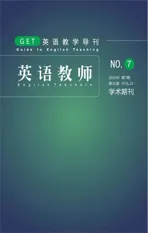AtLife’sCrossroads
2015-02-13
AtLife’sCrossroads
附录2:
2015年4月10日上午开课,金华艾青中学高一学生
In 1989,fresh out of school,I had the intimidating task of choosing a career path before college started in three months. In those days in Pakistan,there were limited options: becoming a doctor or an engineer,or entering the corporate world after getting a business degree. I wasn’t interested in engineering,so that left medicine or business. I couldn’t decide.
My uncle,one of the elders in the family,suggested that I do a work placement to gain experience for a month in a multinational company followed by a month in a hospital. After that,I could make a decision. It seemed like a brilliant idea.
I was accepted for a month’s observatory placement at a foreign bank in Karachi. I tagged along with the sales and marketing people,and got a feel for how the world of finance functioned. I liked the professionalism,made new friends,and generally enjoyed the mostly easy-going work surroundings.
The month passed rapidly,and soon I began my stint at a leading hospital in Karachi. The experience couldn’t have been more different. The hospital had an intense environment,with the buzz in the wards contrasting with the eerie silence of the intensive care unit. The doctors were in a constant rush.
The days started early(at 7 am,compared to 9 am at the bank),and were filled with attending rounds,watching blood samples being taken,and rushing around with the team to the ward,intensive care and clinics. It seemed that everyone was always busy,that there was always work to be done.
While I saw a good number of patients getting well and being discharged,I also witnessed a 16-year-old die. The family’s grief was difficult to handle.
And the night duties! Also known as night calls,they were essentially a 36-hour shift. This was insane,working all day,through the night,and again the next day.
I began thinking about my two experiences.The bank had offered a more relaxed atmosphere,better working hours and less stress. The hospital was full of excitement,and unpredictability,but the studying and training was tough. It seemed that the business option was going to win out.
Near the end of my month at the hospital,I was driving home after a particularly hectic night call. In front of me was a public bus,with college students sitting on the roof,clinging to a small metal railing.As the driver weaved through traffic,I could see the boys shaking from side to side.
Suddenly,a boy tumbled off the back of the bus. He hit the road face down,bounced once,and rolled over. He lay motionless in the middle of the road as the bus sped away.
The cars directly behind the bus braked to avoid the boy,but none stopped. Part of me understood—if he died,it would mean police involvement and unnecessary problems. In fact,I felt the same urge to keep going,but the urge to stop and help was stronger. I knew that if the boy was bleeding into his brain,he could die in a matter of minutes. He had to get to hospital quickly.
I stopped my car and carefully examined the boy,who appeared to be about 20. His face was covered in blood—he had a large gash on his forehead and another above his right ear. There didn’t seem to be any other injuries. I tried to apply pressure to the cuts to stem the bleeding but to no avail. With the help of some bystanders,I lifted his unconscious body into the back seat of my car.
I asked a couple of men to accompany me,but they shrank away from further involvement. I jumped in the car and raced back to the hospital. On reaching the emergency entrance,I shouted,“Head injury!”Paramedical staff whisked the boy into the emergency room,while I gave a quick history to the on-call doctor.
After a preliminary examination,the doctors determined that he was most likely bleeding into his brain. His family was contacted,and he was wheeled into emergency surgery. Since I wasn’t allowed into the operating room,I drove home,exhausted and troubled,the blood on my back seat serving as a reminder of my harrowing experience.
The next day,I went to the operating room to find out what had happened. A surgical aide said that a blood vessel had ruptured in the boy’s skull. The clot had been removed,the bleeding stopped,and the boy was recovering in the ward.
After learning that his name was Asif,I went to see him. His head was in a bandage,and there was excessive swelling around his eyes,but he was conscious. Asif’s parents,grandmother,brothers and sisters were sitting around his bed. The doctor introduced me as the“person who saved your son’s life”.
Everyone got up,with grateful smiles on their faces. The mother held my hands to her face and started weeping.“Son,you are an angel,”she repeated over and over in Urdu. After consoling her,I went over to Asif. He managed to smile and squeeze my hand. No words were spoken between us—none were needed.
What a feeling this was,to help save the life of another person! I spent the rest of the day in a state of exhilaration,the most fabulous mood I had ever experienced. Driving home that evening,I knew what I wanted to do for the rest of my life. Two months of placements could not do what 30 minutes helping an accident victim had done for me.
I enrolled in college for my medical studies and am now an assistant professor and practise as a specialist gastroenterologist in Karachi. I never saw Asif again,but I was told that he made a complete recovery.
We spend a lot of our time wondering about what path to take in our lives. This experience taught me that sometimes,you don’t really have to worry about the big decisions. At times,these decisions are made for you—and that whatever happens is always for the best.
教学实践
